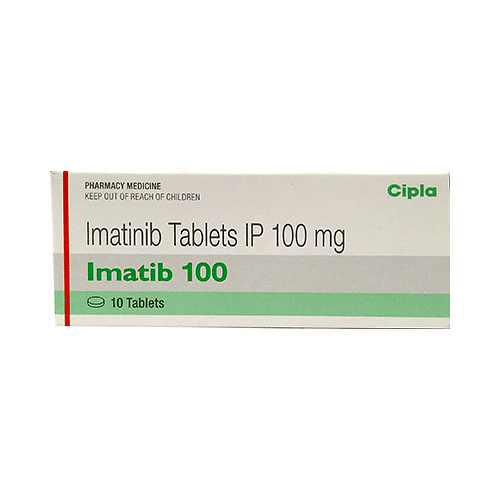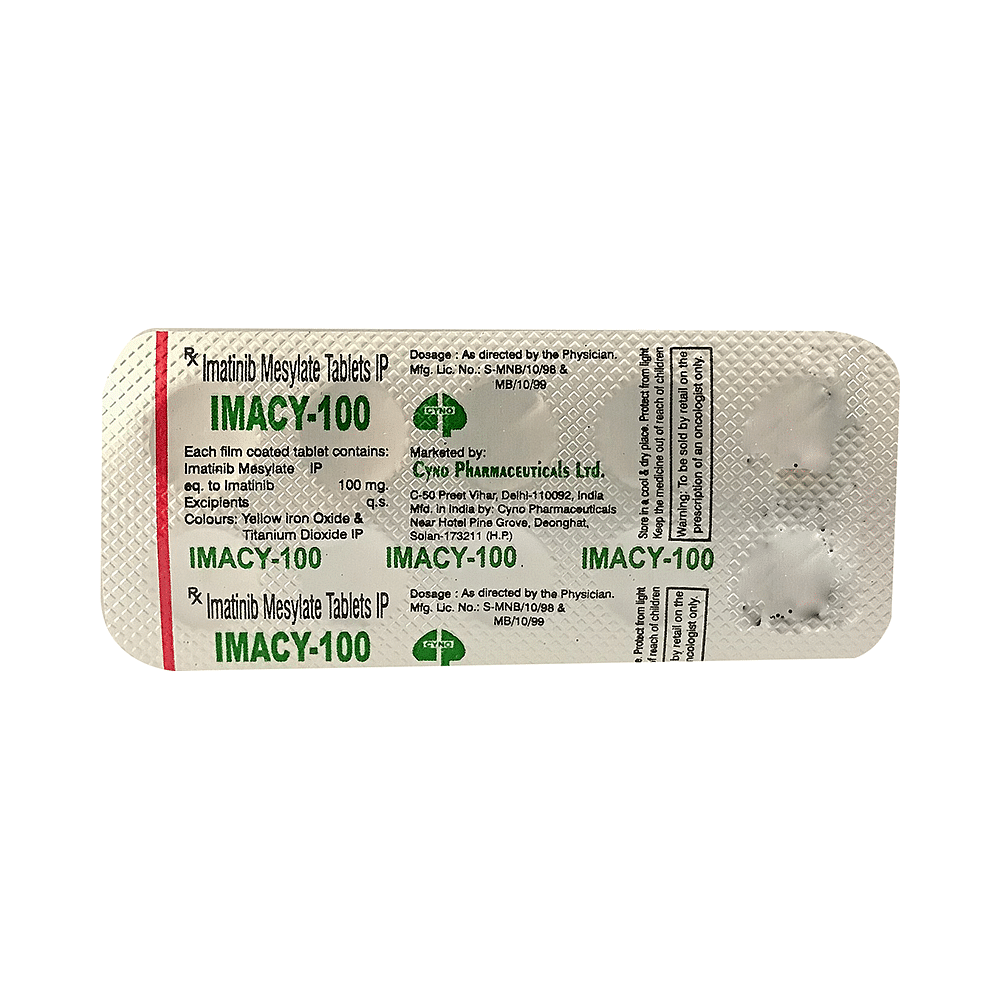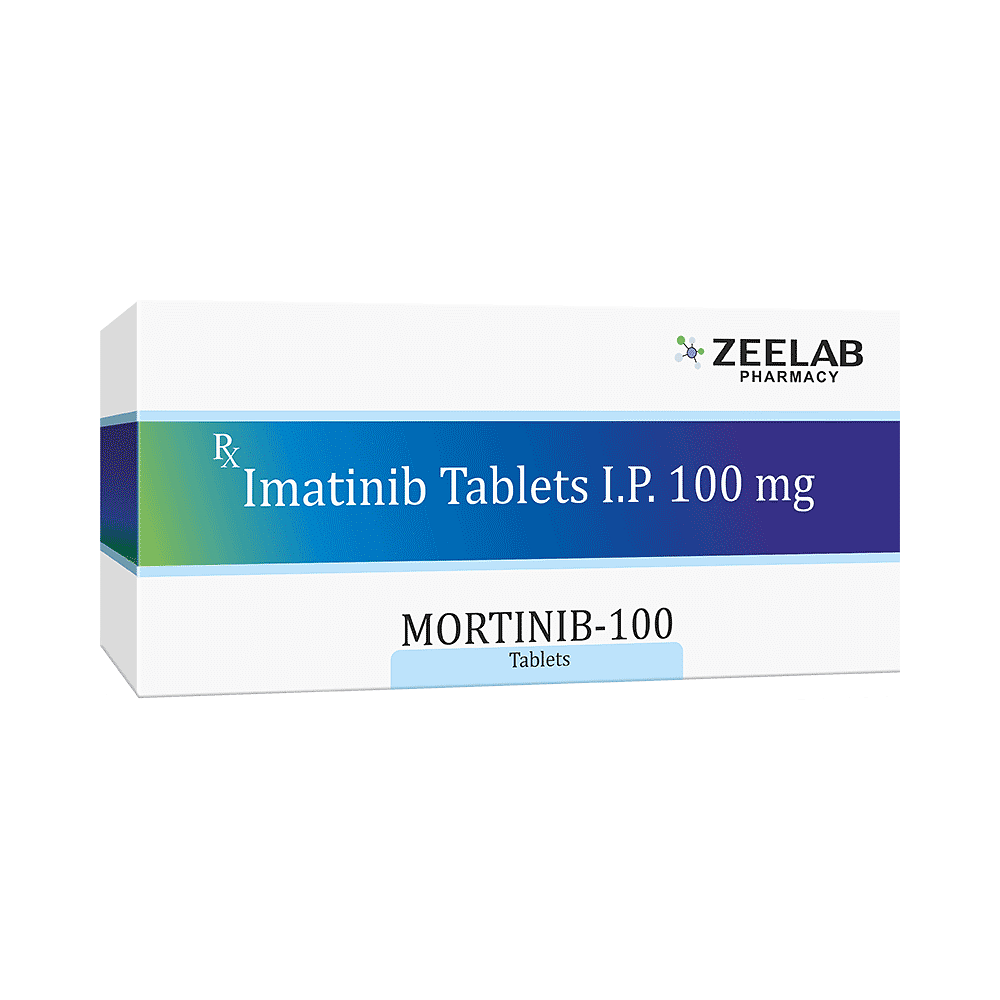
Imat 100mg Tablet
Manufacturer
Biochem Pharmaceutical Industries
Salt Composition
Imatinib mesylate (100mg)
Key Information
Short Description
Imat 100mg Tablet is used to treat several types of cancers, including blood cancers and gastrointestinal stromal tumors.
Dosage Form
Tablet
Introduction
Imat 100mg Tablet is an anti-cancer medication that works by targeting specific proteins that contribute to the growth and spread of cancer cells. It is most commonly prescribed to treat blood cancers (chronic myeloid leukemia and acute lymphocytic leukemia) and gastrointestinal stromal tumors. The medicine should be taken with food. Take it at the same time each day to get the most benefit. Continue taking it as long as your doctor advises for it. The duration of treatment varies according to your need and response to treatment.
Directions for Use
Take this medicine in the dose and duration as advised by your doctor. Swallow it as a whole. Do not chew, crush or break it. Imat 100mg Tablet is to be taken with food.
Safety Information
Side Effects
edema nausea vomiting muscle cramps musculoskeletal pain diarrhea rash fatigue abdominal pain
Alcohol Warning
It is not known whether it is safe to consume alcohol with Imat 100mg Tablet. Please consult your doctor.
Breastfeeding Warning
Imat 100mg Tablet is probably unsafe to use during breastfeeding. Limited human data suggests that the drug may pass into the breastmilk and harm the baby. Lactating women should not breastfeed while using this drug and 15 days after stopping it.
Pregnancy Warning
Imat 100mg Tablet is unsafe to use during pregnancy as there is definite evidence of risk to the developing baby. However, the doctor may rarely prescribe it in some life-threatening situations if the benefits are more than the potential risks. Please consult your doctor.
Interacting Medicines
Atorvastatin Carbamazepine Fluvastatin Lovastatin
How it works
Imat 100mg Tablet is an anti-cancer medication that works by targeting specific proteins that contribute to the growth and spread of cancer cells.
Quick Tips
Always take it with food and a full glass of water to prevent nausea. Do not drive or do anything requiring concentration until you know how it affects you. Notify your doctor about all the medications you are taking, including over the counter medicines and dietary supplements. Do not change the dose or discontinue use without consulting your doctor. Notify your doctor about unexpected rapid weight gain. Do not drive or do anything requiring mental focus if you experience dizziness and blurry vision.
Related Medicines

Imatib 100 Tablet

Imatumor 100mg Tablet

Imacy 100 Tablet

Imatikast 100mg Tablet

Glivec 100mg Tablet

Admine 100 Tablet

Imashil 100mg Tablet

Mortinib 100 Tablet
Frequently asked questions
How should I take Imat 100mg Tablet?
It is recommended to take Imat 100mg Tablet with a glass of water and food to prevent irritation in the food pipe and stomach. If you are having trouble swallowing the tablet, you can crush it and mix it with a small amount of water or apple juice, and then drink it immediately.
Is it safe to drive while taking Imat 100mg Tablet?
Imat 100mg Tablet may cause dizziness, lightheadedness, or drowsiness in some individuals. It is essential to assess your reaction to the medication before operating a vehicle or machinery.
What precautions should I take while taking Imat 100mg Tablet?
While taking Imat 100mg Tablet, it is crucial to follow your doctor's instructions carefully and attend all scheduled appointments. Regular blood tests, weight checks, and urine tests may be necessary to monitor potential side effects. Additionally, use a reliable method of contraception to prevent pregnancy during treatment, and inform your doctor immediately if you become pregnant. Also, consult your doctor before taking any new medication.
Why do I develop rashes and severe itching when I have sun exposure after taking Imat 100mg Tablet?
Imat 100mg Tablet may increase your skin's sensitivity to sunlight. Prolonged exposure to sunlight may cause skin rash, itching, redness, or severe sunburn. To minimize this risk, wear protective clothing and use a broad-spectrum sunscreen with an SPF of 15 or higher when spending time outdoors. If you experience a burning sensation on your skin, consult your doctor.
Can I take other medications while taking Imat 100mg Tablet, or should I consult my doctor first?
It is essential to consult your doctor before taking any medication while on Imat 100mg Tablet therapy. Certain medications, including paracetamol, cyclosporin, dexamethasone, warfarin, antiviral medications, and certain antibiotics, may interact with Imat 100mg Tablet. Inform your doctor about all medications you are taking, including over-the-counter medications and supplements.
Can I expect to be cured of CML if I take Imat 100mg Tablet regularly as advised by my doctor?
Imat 100mg Tablet has shown effectiveness in many cases of CML, and it has been associated with increased survival rates. However, the likelihood of cure and treatment outcomes can vary depending on individual factors, such as the patient's current state, blood test results, response to treatment, and any underlying medical conditions. Consult your doctor for personalized guidance and treatment expectations.


